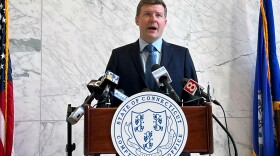Chamber musicians from Historically Black Colleges and Universities (HBCUs) will be in New Haven Friday to perform works by HBCU composers.
It’s part of a regional concert tour called HBCUArts: Chamber Music for a Cause, which will highlight overlooked composers and raise money to fund ongoing arts programs at HBCUs.
Jolie Rocke, a soprano singer, founder of HBCU Arts and tour organizer, said in a release the concert promotes a rich artistic legacy.
“The classical compositions emerging from HBCU traditions represent some of the most innovative and moving works of American music,” Rocke said.
The series will perform along the Eastern Seaboard, from Washington D.C., to Martha’s Vineyard in Massachusetts until Aug. 3. The donation based concert in New Haven will be held at the United Church on the Green on Friday, Aug. 1, at 7:30 p.m.
Musicians including Rocke, will perform works by historic and modern day composers such as Jasmine Arielle Barnes, and also from more well known artists such as Roberta Flack.
Rocke and others, including Lauren Ford, the director of partnerships at HBCU Arts, say the performances highlight the rich artistic legacies of music from HBCUs that left an indelible mark on American music.
Rocke said African Americans have had a long history in musical composition, even if much of it went unnoticed or ignored by the general public.
“There are a lot of people who just did not necessarily realize that there are so many composers from the HBCU tradition,” Rocke said. “We look back in the 1870s with Negro spirituals having been created by formerly enslaved people.”
Many of these artists, according to the Julliard Music School, faced prejudice and institutional racism that other African Americans faced back then.
Many relied on HBCUs to foster their careers. But those challenges also lingered far into the 20th Century, even as Black artists achieved success in popular music. Rocke said Undine Smith Moore, a woman composer, taught music at a HBCU into the 1970s.
While Moore, who died in 1989, achieved critical success for her work, according to Vermont Public, Rocke said Moore was not as well known as she should have been.
“Had she lived today, she probably would have been much more well known because she would have had more doors open to her on stage and for her work to be heard,” Rocke said.

Rocke said many of those historic challenges are still too often present day realities and said people of color continue to face barriers to these spaces due to stereotyping and misperceptions of their skillsets.
Rocke and others, including Lauren Ford, the director of partnerships for HBCU Arts, said their organization is designed to be inclusive. The concert tour Rocke said, has set a $30,000 fundraising goal.
Ford said the Career Resource Entrepreneurial Development Opportunity (CREDO) section of HBCU arts connects students from HBCUs with arts opportunities.
“It's really important to me that they get the opportunity, and this particular program CREDO allows them to do that,” Ford said.
Barnes, the composer whose works are set to be performed in New Haven, was born in 1991 and graduated from Morgan State University. Rocke said she resonated with a piece called Flowers, from her Songs for the African Violet.
“This song actually talks about the African Violet and how she's often unheard and overlooked and you have to water your flowers,” Rocke said.
As for United Church on the Green, Rev. Dr. Stephen G. Ray, Jr. and his wife, Susan, said they are excited about the performance. Ray said she sees it as a chance for New Haven residents to enjoy music.
“It's a wonderful opportunity in New Haven for people to come and listen and as Dr. Rocke said, a whole variety of music and get exposed to some music that we may not have heard before,” Ray said. The church is very happy to be supporting this concert and the goals of HBCU arts.”





